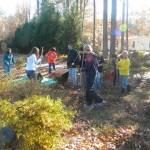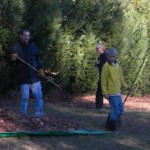Replay: When ‘community’ hinders community
Three years ago, I wrote a post called “When ‘community’ hinders community” as part of a week long synchroblog on the topic of community. The point of the post is that we can build a community around some focus other than Jesus Christ. However, this other kind of community will always hinder the growth of the community that God wants to build through the Holy Spirit that is centered and focused ONLY on Jesus Christ.
——————————–
When ‘community’ hinders community
This is my second post in the “Community” synchroblog that is taking place this week. My first post was called “Community is unnatural today“. Glenn at “re-dreaming the dream” organized this synchroblog. Posts will be added to this synchroblog throughout this week by various individuals. If you’d like to take part in this synchroblog, write your post and leave a comment with a link on Glenn’s latest synchroblog info post called “Community Synchroblog“.
Community is simply a group of people connected by some common bond. It is possible to relate to other people as community based on many different things: location, vocation, hobby, age, children, school, etc. Within the church, it is popular to build community based on meeting location, rules, doctrines, and human leadership. However, these types of commonality are not the foundation for the community that God is building.
Instead, God builds his community (perhaps a better translation of “ekklesia”) on the person of Jesus Christ and the common fellowship that his children have with him through the Holy Spirit. The community that God builds begins with a relationship with God himself through Jesus Christ and the Spirit. But, community doesn’t end there. God continues to build that community through relationships with one another. In fact, you could say that these interrelationships are the outward signs that God is building community. But, it must begin with God himself – both his work and our relationship with him. Finally, God’s community does not end with interrelationship among his children. Instead, God’s community reaches outside itself and welcomes those who are not yet part of the community.
The outward-looking and outward-loving aspect is perhaps one of the most peculiar aspects of the community that God builds. In almost every other case, community because a boundary, both for keeping people in and for keeping people out. When community is not based on loving God, loving each other, and loving others, then the community quickly becomes isolated and independent – the opposite of God’s community.
But, what happens when God’s children decide to build their own community based on meeting location, rules, doctrines, or human leadership? Again, the community turns inward and becomes more about who is outside of the community than welcoming people into the community. Differences and disagreements and struggles, even among those who are brothers and sisters in Christ, become justification for not welcoming or accepting someone into the community. The “community” ends up hurting and isolating themselves from the very people that should help them form the community.
Thus, it is possible to build a “community” – a true community in every aspect of the word – that hinders the community that God desires to build – a community that is centered on Jesus Christ and a common love for God, each other, and others. In fact, I believe that many who write of loving Jesus but not the church, or who write of being hurt by the church, or who write of being disillusioned by the church, are living the after effects of a community that is based in something other than Jesus Christ – the type of “community” that expels easier than it welcomes.
Replay: You don’t know me but I’m your brother
Two years ago, I wrote a post called “You don’t know me but I’m your brother.” No, the post was not about the famous Doobie Brother song, although I am humming the song to myself as I type this. The point of this post is that we are related to one another through our common relationship with God. Because of that, we should seek fellowship and unity with one another. “Unity among brothers and sisters in Christ is not just a good idea. It is one of our primary arguments and our primary evidences that Jesus Christ is God’s Son.”
———————————-
You don’t know me but I’m your brother
We were made for community. It is difficult to read any part of Scripture without recognizing this important fact. We were made to fellowship with God and with one another.
Unfortunately, we often don’t take the time to build relationships with one another. And, when we do start building relationships, we often stop when it becomes a struggle. In fact, that struggle – or “<a href=”http://www.alanknox.net/2007/09/depths-of-community.html”>relational friction</a>” as I’ve called it before – is an indication that we finally beginning to form a relationship. We’re finally starting to get down below the surface into the depths of community.
It is there in the depths – below the surface level – that we begin to understand that “love one another” includes loving those who are not like us and don’t believe like us and sometimes aren’t even pleasant to be around. It is there in the presence of relational friction that we truly begin to understand what it means to forgive one another, bear with one another, accept one another, live in peace with one another. Unfortunately, too often, before we can even begin to live in the reality of these “one anothers”, we give up on the relationship all together and look around for someone who is more like us so we can be “like minded”.
There is a reason that Paul wrote a letter to the church in Philippi exhorting them to have the “same mind”. What reason? Because it’s not easy – it’s not natural – at least, not in our fallen state. There is a reason that Paul wrote a very personal letter (Philemon) about a very personal problem (a runaway slave named Onesimus) and addressed that letter to several people and the entire church that met with Philemon. What reason? Because we naturally want to protect ourselves and our own interest. We need help to look beyond ourselves to see the benefit to the kingdom of God.
We use our doctrines, our creeds, our confessions, our interpretation, our denominations, our leadership, our structures… many man-made things in fact… as excuses to separate from other believers. Or, if we don’t outright separate, then we use these things as excuses to choose who we will form relationships with and who we won’t form relationships with. We would prefer to sit in an auditorium on the other side of the city filled mostly with strangers than to deal with the relational friction caused by differences with those who live next door to us.
Why? Because we don’t allow God to form our primary identity. Oh, we say that we’re brothers and sisters in Christ, but we live as if we’re second cousins at best. We says that we all have God as our Father, but we would prefer it were not so.
Guess what? We don’t choose our brothers and sisters… God does. And we are specifically told (in the context of doctrinal differences) to accept others just as God accepted them in Christ Jesus (Romans 15:7).
The person across the street who is a brother in Christ… is our brother in Christ, and it is our responsibility – as much as depends on us – to foster a relationship with him. The person who works in the office who is a sister in Christ… is our sister in Christ, and it is our responsibility – as much as depends on us – to foster a relationship with her. This is true for every believer that God brings into our life. Yes, everyone of them. Will we have the same depth of relationship with all of them? No. But, that’s not the point. Our relationships with our brothers and sisters should be growing and deepening – even with those who disagree with us. If we’re looking for excuses to stay away from a brother or to not relate a sister, then there is a problem with us… not with them.
Unity among brothers and sisters in Christ is not just a good idea. It is one of our primary arguments and our primary evidences that Jesus Christ is God’s Son and was sent into the world to redeem the world (John 17:20-24). We should grieve over the fact that we have lost this argument and evidence. Then, we should seek the unity of the Spirit – he is providing if we will simply live in it.
Predicting, Listening, Craving, and Serving
As I wrote a few days ago, there are so many good blog posts in my feed reader right now that I can’t possibly create a separate post for each one of them. However, I do want to point my readers to them, because… well, like I said, they’re very good.
So here are another list of posts that I found extremely encouraging and challenging.
I hope you take the time to read these posts. I think you’ll be glad that you did.
Eric from “A Pilgrim’s Progress” writes “I Can’t Predict Who’s Interested“
In his post, Eric is primarily talking about church. Until he talks to people, he cannot tell who is interested in discussing and living out issues regarding the church. However, I think this applies to the gospel as well.
Guy from “The M Blog” writes “Listening to one another’s stories“
He says that we must listen to one another before we can help, teach, disciple, etc. one another. And, while I agree with Guy that “listen to one another” is not one of the commands found in Scripture, it does seem to be an important foundation to many of the commands, especially the “one another” commands.
Bobby at “Deconstructing Neverland” writes “Craving for community“
He talks about some of the obstacles and frustrations that people face when they seek community with other believers. I know these obstacles and frustrations are real. Not only have I faced them myself, but I get emails from people all the time who face the same things.
Chris at “The Amplified Life” writes “A Quick Thought on Serving Others“
He is surprised that a gesture as simple as holding the door for someone is rare. What about real acts of service? Is the church any better than culture at serving others?
I’d love to hear what you think about these posts.
Without church programs, we can still serve together
In two of my previous posts, I talked about the danger of being busy with church programs and activities, and the difficulty that we often face when moving away from these types of programs. (See my posts “Numbing our souls with church activities” and “Growing past church programs and activities is not easy.”)
In church programs and activities, the program or activity is the unifying force. Without the particular class or project, the people involved would probably not work together. And, when the class or project is complete, the people who were involved often don’t interact with each other much anymore. (Granted, people who have relationships with one another can be involved in programs and activities together. But, these relationships are generally not built through the classes or projects.)
However, this does not mean that we should not serve, teach, disciple, and evangelize together. In fact, I believe this is a very important part of our life together as the church. As we share life together (fellowship) in Christ, the Spirit will (super)naturally lead us to people who need help. These people may be strangers, but they will often be acquaintances or friends of people who are part of our group. Thus, we serve through our relationships with Christ and one another toward ourselves (in teaching, discipling, serving, etc.) and others (in evangelizing, serving, etc.).
The difference between serving through church programs and serving through relationships may be undetectable to those outside the groups. In either case, the person being served only knows that a group of people seeks to help and love them, hopefully in the name of Jesus Christ. (Of course, the difference would be obvious to someone who is part of the group.)
However, the difference is very important to the people who are actually working together to serve, teach, evangelize, etc. Why? Because maturity in Christ comes through our mutual fellowship with one another – that is our relationships with Jesus Christ and with one another. We do not grow in maturity simply because we do certain activities together or at the same time.
And, even more, maturity is to be a continuing and consistent process. Groups of Christians that serve through their relationships will continue to relate to one another after that particular act of service is complete. In this way, we get to know one another – our strengths and weaknesses – and are able to continually help one another through various opportunities to serve together.
This ongoing aspect of these relational groups (relating to Christ and to one another) is extremely important. We grow in maturity in Jesus Christ as we are interconnected with one another, not merely when we do thing together. It takes time and consistency for this type of interconnection and interrelation.
In relational service, the particular act of service is not as important as the people involved – either the people serving or the people being served. The group will gladly add to, modify, or stop certain acts of service for the benefit of the people. Again, this is different than most church programs or activities, which are usually continued even if they are no longer effective.
So, while most of us may be more familiar and more comfortable serving, teaching, evangelizing, discipling, etc. through certain church programs and activities, it is not only possible but preferably to serve together through relationships.
Growing past church programs and activities is not easy
In a previous post, “Numbing our souls with church activities,” I said that church programs and activities keep us busy doing “good things” to the point that our souls become numbed to our real issues that we should be dealing with. However, recognizing the danger in filling our lives with programs and activities is only the first step, and the remaining steps toward growth are not easy.
To begin with, when we step away from the church programs and activities, we often learn that we don’t know how to serve people, to disciple people, to evangelize people, to teach people. All we know how to do is to attend programs. Even those who lead the programs often find themselves lost with the structures and confines of the program or activities.
This is probably most obvious when it comes to fellowship and activities. Often, those people that we feel closest to in the programs disappear when the program ends. We find that we do not really have relationships with those people. At the best, we have an acquaintance with one another.
It is a painful realization when we discover that we are actually very immature when it comes to service, teaching, evangelism, discipleship, and fellowship. The pain is enhanced for those of us who have been Christians for a long time. The pain, unfamiliarity, and discomfort often lead Christians to assume that it is wrong to move away from the programs and activities, and they begin to fill their lives with them again.
Once Christians grow beyond this stage, they began to form real relationships with other people. This is the next difficult step in growing past church programs and activities. Why? Because when we truly begin to grow in our relationships with one another, we learn people’s flaws as well as their strengths, and people learn about our flaws as well as our strengths as well. We can no longer hide behind church programs and activities.
Not only do we now have to learn to accept people in spite of their weaknesses, we have to trust other people with our own weaknesses. If we never reach this stage, then again our mutual growth will be hindered.
Once we are able to admit that we don’t truly know how to love God and others (because we had only been attending programs and activities), and once we admit that we don’t know how to build relationships with one another (we’ve only been acquaintances before), we are finally able to begin growing together.
The task is not easy. In fact, apart from Christ working in and through us by the Holy Spirit, the task is completely impossible. However, as we surrender ourselves to Christ together and learn to listen to, encourage, admonish, and help one another, we will find amazing growth toward maturity in Christ as a group.
A more-than-Sunday community
Since his family’s move a few months ago, Arthur from “The Voice of One Crying Out in Suburbia” has been chronicling their search for church and community. As he has explained many times, they are seeking a simple expression of church while maintaining relationships with those who are part of more institutional churches.
His latest post, “Simple church on Sunday is just the start,” is a very important step in this process.
Arthur understands that whatever form the church meeting takes on Sunday (or whatever day the church meets), one meeting per week will not develop community – at least, not the community and fellowship that we read about in the pages of the New Testament.
So, what does that mean? It means that Arthur understands that he and his family must spend time with believers throughout the week. And, guess what? Arthur gives us some examples of things he plans to do:
I don’t think that given the realities of life in America in the 21st century that community must precisely resemble the first century in every respect. Nor do I think that community will necessarily resemble more communal historical Christian groups like the Hutterites. So I think it will look quite different in different contexts. Where I live out in the country, perhaps we meet as families in one place or another on a regular basis (other than the Sunday meeting!). Maybe BBQ on a Saturday where we spend the day together. I am really interested in getting a Bible study going in our area, I know enough people to make it work. We already have a connection with a youth group that is not affiliated with a particular church that meets a lot. Even something as simple as intentional visits to other Christians would foster a sense of community. Of course having the weather lighten up would be nice, we have had almost ten inches of rain in the last month or so! Even out where we live I could see families buying property or houses near one another to increase proximity although a lot of us have more or less established roots so that may not be as feasible.
Later in the post, Arthur makes some suggestions for people living in more urban areas.
What are some other ways that you and your family have developed (or could develop) relationships with other believers near you?
I need help serving my neighbor
Last Saturday was a bad day for me. I think I caught some kind of stomach bug. I’ll spare you the details.
But, Saturday evening, I received a phone call that was very encouraging!
A friend of mine called and told me about his neighbor. I knew a little about her already from talking with him before. She had recently experienced a couple of deaths in her immediate family, and she was not handling it well.
This neighbor had welcomed my friend and his family into her life. But, as my friend told me, they thought they needed help. The lady was open to meeting and talking with more people. Did I have any suggestions?
We talked about possibilities for a few minutes, then he said that he would bring it up with the church Sunday. He would ask our brothers and sisters if they had any suggestions on how his family could better serve this neighbor. He would also ask them if they would be willing to spend time with his neighbor.
Unfortunately, my unwelcomed visitor decided to stay with me through Sunday morning, so I did not meet with the church. I know that my friend talked about his neighbor, but I don’t know what was said.
Last night, some other friends invited Margaret (my wife) and me out to dinner. There were six of us all together. Guess what one of the topics of conversation was? Our friend’s neighbor. (And, no, I didn’t bring up the topic.)
I think something special happens when the church (as a whole) gets involved in someone’s life. Some call it “belonging” before “believing.” I call it taking Jesus Christ to people through his community.
What do you think? Have you ever been part of a church or group of believers who served someone together like this? Have you ever been served or helped in this way?
Guest Blogger: Not Alone in Feeling Alone
I’ve invited several people to write “guest blog posts” for this blog. There are several reasons for this: 1) To offer different perspectives. 2) To generate even more discussion and conversation between blogs. 3) To introduce other bloggers to my readers.
(If you are interested in writing a guest blog post, please contact me at aknox[at]sebts[dot]com.)
Today’s post was written by Dan from “The Ekklesia in Southern Maine.” You can also follow Dan on Twitter and Facebook.
————————————-
So Alan asked me to write a guest post for his blog. I asked him what he wanted me to write about and after saying “the church” which didn’t really narrow things down too much, he asked me, “What is the one thing you would want to say to my readers?”
“You are not alone.” That is the thing that I want to say to you. You are not alone, even when it feels like it. Many readers on this blog see the value of community and meaningful relationships among the Body of Christ. Many readers on this blog have faced resistance when trying to implement those things into their lives and into the group of believers they are part of. That can be very discouraging and often very lonesome. I know. I’m there.
Some of you may have gone to seminary with Alan, and may have had the opportunity to be part of the great community of believers that he is part of in that area. You may have left school thinking that you would find something or be part of something similar when you arrived wherever you were going. If you are like me, you quickly found out that it wasn’t going to be that easy. Strong, community-minded bodies of believers are not found around every corner, and very often they are not as equipped to integrate new people as the one in this community.
Others of you may read about all this stuff and think, “I would move anywhere for this,” or, “This is all wonderful, but completely utopian and unrealistic.” You have never been part of any kind of real community of believers. You have never seen pastors who step aside (or more like “step in”) and let the congregation minister to each other. You find all the talk of these wonderful things to be so far from your experience that you never expect to see it in real life.
One thing is certain, for both of these groups of people, it can be extremely discouraging to read of (or remember) the wonderful blessing of being part of a community of believers who encourage each other to grow in Christ – who laugh together, cry together, and live together – and then look around yourself and see nothing like that.
I had the opportunity to observe this kind of community when I was at seminary with Alan. I never really put the effort into being part of that group. But I saw how they treated each other, and it was really quite wonderful. I saw how people were growing together and helping each other along, and it seemed like such a great expression of the love of Christ among his body.
Then I moved back to Maine. I had stuff going on in my life at the time, and I wasn’t interested in people being close to me. It was a couple of years before all that stuff settled down and I started to really desire to be part of a community of believers, for me, for my wife, and for our kids. That was over a year ago now. We have spent time with many nice people, we have even visited a couple of “house” churches. The people either lived too far away, or the “house” church was just like everything else we had already seen from the institutional church: we all met on a certain day, sang some songs, talked about the Bible, ate some food (this was a nice addition to the traditional service!), and went our separate ways until next weekend. Obviously not the community or “shared life” we were thinking of.
The struggle is that being part of a close community of believers is hard work. You can’t just go to a once-a-week service. You have to take time to spend with those people, care about those people, and make an effort to share your life with them. This is hard and something I am not very good at. It is even harder when there aren’t a group of people already doing that, a group that you can integrate yourself into.
There are lots of other reasons that this is so difficult, but suffice it to say that it’s hard. I think that there may be quite a few people that read this blog, and think that they are the only ones who can’t make this happen, who can’t find and be part of this kind of community, who want to be the church as Christ called us to be but just don’t know how. You are not the only one. It is hard for many of us, and many of us, myself included, are nowhere near anything like that. We are no longer content with traditional church structures and “Good morning brother, how are you?” type relationships. But we can’t seem to find the deeper relationships, the more meaningful fellowship, and mutual edification. So, ironically, in our pursuit of more honest and meaningful relationships with our brothers and sisters, we end up alone and alienated.
I could give you “the answer,” but I don’t have it. We have Christ. We are never alone, but sometimes it sure can feel that way. So when you are feeling discouraged and disappointed about where you are, just know that you are not alone in feeling alone.
Am I the only one who struggles with this? Why do you think it’s so hard? Are you part of a community of believers and still feel this way sometimes?
When the church becomes visible without signs or marketing
Keith at “subversive1” is writing a series discussing some of the problems (real and perceived) of organic church.
(Now, from the beginning, we must admit that all organic churches are different, so it’s difficult to write this kind of series.)
The latest post is called “Invisible: Organic Church.” This is what Keith says in introducing this weakness:
In our discussion we reflected on the fact that house churches don’t have large signs out front, and don’t market themselves the way traditional churches do. Because of this, it’s often likely that a house church could exist for years right down the street from another house church and not even be aware of each other. Not to mention the fact that people in the community are also not aware that the house church meeting is taking place in their neighborhood.
In the post, Keith offers several suggestions as to how organic or simple churches can become more visible.
We’re found one primary way to let people know that the church is among them: serve people in your community together and introduce them to your brothers and sisters. It’s simple. It’s effective. It gets the focus off of your particular organization (whether that organization is highly organized or not).
When we serve people together, we never say, “Hi, we’re from such-and-such church.” Why? Because the name and location of our meeting is not important.
Instead, we might say something like, “Hi, we’re friends of so-and-so. She/He said you might need some help with your yard work. Can we help you?” At some point, usually when asked or when talking to them later, we’ll explain that we are serving them because God loves them and we love them. We’ll explain that Jesus Christ had welcomed us into his kingdom, and his kingdom was one of loving and serving others.
How do you let people know that the church is in the neighborhood?
When Sunday is just one day out of the week
As I’ve mentioned previously, our church is currently studying Acts together. Last Sunday, we worked our way through most of Acts 2. Next Sunday, we’re planning to finish that chapter.
Of course, Acts 2 includes this amazing summary of the new life that those first believers shared in Christ:
And they devoted themselves to the apostles’ teaching and fellowship, to the breaking of bread and the prayers. And awe came upon every soul, and many wonders and signs were being done through the apostles. And all who believed were together and had all things in common. And they were selling their possessions and belongings and distributing the proceeds to all, as any had need. And day by day, attending the temple together and breaking bread in their homes, they received their food with glad and generous hearts, praising God and having favor with all the people. And the Lord added to their number day by day those who were being saved. (Acts 2:42-47 ESV)
Did you notice that twice Luke writes “day by day”? And, beyond that phrase, notice the number of descriptions that require close and constant interaction: “they devoted themselves” (literally, “they kept on being faithful to…”), “were together,” “had all things in common,” etc.
These early disciples did not see each other on Sunday and then live the rest of the week separated from one another. They were intimately connected with one another’s lives – right away! This does not necessarily mean that they gave up everything else in their lives. It means that they included one another in every aspect of their lives.
It is so much different today. Today, if Christians see each other in the crowd on Sunday, then that’s enough. If we also see each other on Wednesday night, then we call it a close relationship. If we grab a plate and scarf down our food quickly before prayer meeting, then we call it fellowship.
But, in our neighborhoods? In our work places? In our schools? At the park? No. We don’t hang out with one another in those places… only in the church building for church sanctioned programs.
The focus on Sunday (and the church building and the church program and church leadership) is killing the church.
But, when Sunday becomes just another day out of the week, and we learn to actually share our lives with one another throughout the week, wherever we are, and whatever we’re doing, we will see new life – the life of Christ through the Spirit – coursing through the church again. Why? Because when we fellowship (actually fellowship) with one another, we are truly fellowshiping with God the Father and with his Son Jesus Christ. (1 John 1:3)
(No, this post is not about honoring one day above others – which would have been a reference to Saturday, the Sabbath. In the early church, even those believers who honored the Sabbath above other days ALSO shared their lives with one another often during the week, not just on that one day.)










